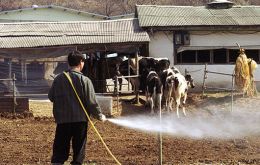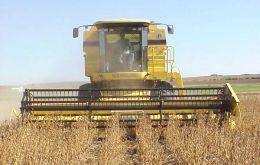MercoPress. South Atlantic News Agency
Agriculture
-
Thursday, May 6th 2010 - 19:34 UTC
France Warns EC on Possible Resumption of Negotiations with Mercosur

After the European Commission proposed the resumption of negotiations with Mercosur, France released a warning message to the European Commission and assured that—if the talks are reactivated—both French and European agriculture would be in danger of a potential damage.
-
Wednesday, May 5th 2010 - 23:03 UTC
European Farmers up in Arms Against Resumption of EU/Mercosur Talks

France’s main farmers’ organization, FNSEA, called Wednesday on President Nicolas Sarkozy to pressure upon the European Community to impede the re-launching of negotiations for a free trade agreement with Mercosur
-
Wednesday, May 5th 2010 - 05:58 UTC
Chile Moves to Regulate and Permit Cultivation of GM Crops

Chilean Agriculture Ministry José Antonio Galilea announced this week plans to introduce legislation to regulate and permit the cultivation of genetically modified (GM) crops in Chile.
-
Monday, May 3rd 2010 - 01:51 UTC
FAO Urges Heightened International Surveillance Against Foot and Mouth Disease

FAO urged heightened international surveillance against foot-and-mouth disease (FMD) following three recent incursions in Japan and South Korea.
-
Saturday, May 1st 2010 - 03:50 UTC
Lab Production of Green Hamburgers is “No Longer Science Fiction”

The lab production of meat without the need of slaughtering animals is no longer science fiction and could be producing “green” hamburgers in less than ten years according to the list of Time Magazine fifty main inventions of the year.
-
Thursday, April 29th 2010 - 07:28 UTC
Outbreaks of Foot-and-Mouth Disease in Japan Includes Cows and Pigs

Japan has discovered suspected cases of foot-and-mouth disease in pigs at a farm in Miyazaki prefecture, where the government confirmed the first outbreak since 2000 in cows last week.
-
Thursday, April 29th 2010 - 07:18 UTC
Farm Exports Leading Latam Strong Recovery, Says FAO

Latinamerica and the Caribbean are undergoing a strong recovery boosted mainly by agriculture exports, said José Graziano da Silva, head of FAO’s regional office in Panama, during the presentation of the Report on Agriculture and Rural Development 2010 Prospects for Latinamerica.
-
Thursday, April 29th 2010 - 06:41 UTC
Sugar Prices Fall on Prospects of Abundant Crops in Brazil and India

Sugar fell in New York and London, reversing earlier advances, as an improved outlook for production in Brazil and normal rainfall in India outweighed concern that supplies will fall short.
-
Monday, April 26th 2010 - 21:24 UTC
Uruguay 2010 Soy-Bean Boom Crop Could be Just a One Year Record

Uruguay is currently harvesting what is considered a record crop of soybean the ever expanding oil seed that as in neighbouring countries is taking over land from other exploitations and has made Mercosur the world’s leading producer and exporter.
-
Tuesday, April 20th 2010 - 15:55 UTC
Farming nations meet in Uruguay in anticipation of G-20 summit

The world's large economies could make progress to revive stalled world trade talks at two G20 summits later this year, officials from farming nations said on Monday at a two-day meeting in Uruguay.